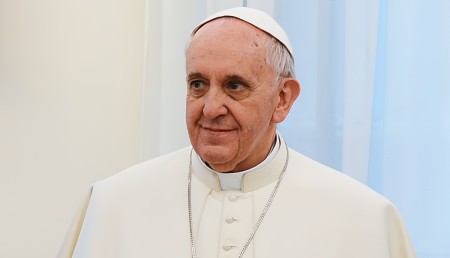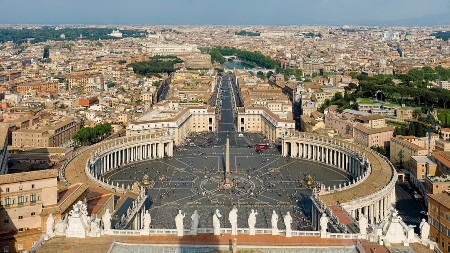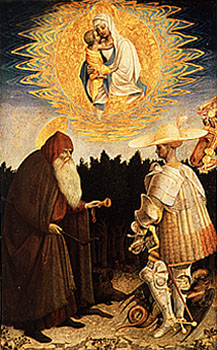Footwashing as Mandatum.God is Love and Love is a Verb
FREE Catholic Classes
When the Lord rose from that table, He showed us the naturally supernatural expression of Love; an expression that reveals the heart of the Christian vocation. He, who is Lord and Master, King of Kings, took off His Cloak of Royal Splendor and became a Servant. He washed the feet of those whom He had chosen to continue His Redemptive work. He showed them what they were chosen to do. Then, He enlisted them to live lives of self emptying Love for the world. To bear the name Christian is to walk in this love in the midst of a broken and wounded world that is waiting to be reborn.As we enter into these three days, the one day, we make this mystery our own. No mere spectators in this Act of Love we become participants. We who bear the name Christian are to pick up that basin and towel, to climb upon that Cross and learn to live the Way of Love in service.
Highlights
Catholic Online (https://www.catholic.org)
4/2/2015 (9 years ago)
Published in Living Faith
Keywords: footwashing, mandatum, Holy Thursday, Love, Deacon Keith Fournier
CHESAPEAKE, VA. (Catholic Online) - "God is love, and he who abides in love abides in God, and God abides in him" (1 John 4:16) These words from the First Letter of John express with remarkable clarity the heart of the Christian faith: the Christian image of God and the resulting image of mankind and its destiny... I wish in my first Encyclical to speak of the love which God lavishes upon us and which we in turn must share with others."
With those words, Pope Emeritus Benedict XVI began his beautiful encyclical letter entitled Deus Caritas Est (God is Love). It was released on the Nativity of the Lord in the year 2005. It should be read by every Christian.
The word Encyclical means circulating letter. In the early Church there were no printing presses and there was no internet. The Bishops would hand-write letters for the faithful and they would be circulated, passed around. That tradition continues in the Church in our own day.
The Holy Thursday Evening Mass of the Lord's Supper begins what is called the Triduum (Latin for three Holy days). In his message for the Chrism Mass in Rome in 2010 Pope Benedict reaffirmed the ancient understanding concerning these three days, saying that "they could be considered one single day. They reveal the heart and are the key to both the liturgical year and the life of the Church."
Last Sunday we celebrated Passion or Palm Sunday. Just prior to the reading of the Passion Narrative, we heard proclaimed one of the most ancient of the passages contained within the Sacred Scripture. St. Paul´s powerful words concerning Jesus´ self emptying, in Greek, it is called kenosis.
It is recorded in the second chapter of his letter to the Philippians. "Christ Jesus, though he was in the form of God, did not regard equality with God something to be grasped. Rather, he emptied himself." (Phil. 2:6-11) That self emptying for others is what Love is all about.
In the words of the beloved disciple John "God is Love" and we are called to live in that kind of Love. We are called to pour ourselves out for one another. God so loved the world that He gave His only Son (John 3:16). The great mystery of the love given to us in and through Jesus Christ is what we will celebrate in the next few days, this one day.
The Evening Mass of the Lord's Supper of Holy Thursday deepens our understanding of the self emptying love of Jesus Christ. We celebrate the gift of the ministerial priesthood which continues to make present the Priesthood of Jesus Christ present in the Church in our own day.
When the Priest stands at that altar,he stands in Jesus Christ the High Priest. Christ is the Priest and the Victim. Jesus gave Himself to us and in the Eucharist he comes to reside within us. The Holy Sacrifice of the Mass is the Holy Oblation of Incarnate Love.
At the Last Supper, Jesus Sacramentally anticipated the altar of the Cross at which He would willingly pour out the last drop of His Blood, out of love for the world. He did so to set us free from the bondage of sin and death. St. Paul told the Galatian Christians, "For freedom Christ set us free." (Gal. 5:1)
When the Lord rose from that table, He showed us the naturally supernatural expression of Love; an expression that reveals the heart of the Christian vocation. He, who is Lord and Master, King of Kings, took off His Cloak of Royal Splendor and became a Servant.
He washed the feet of those whom He had chosen to continue His Redemptive work. He showed them what they were chosen to do. Then, He enlisted them to live lives of self emptying Love for the world. To bear the name Christian is to walk in this love in the midst of a broken and wounded world that is waiting to be reborn.
This is the same world which He still loves. It is being recreated anew as He continues His Mission through the Church, His Body, of which we are members. The early Christians spoke of the Church as the new world and the world in the process of being transfigured.
We are a part of that Mystical Body of Christ, that Communion of Love which is called the Church. That Church still brings heaven to earth and earth to heaven. It is by coming to grasp this mystery - or rather be grasped by it - that we come to understand that Love is a verb.
Our Priest, stands, to use the Latin phrase, "in persona Christi" (in the Person of Christ). He will rise and take the basin, towel and washcloth. Then he will wash the feet of people chosen to symbolize the members of the Body of Christ, the Church.
The Love of the Incarnate Word, the Second Person of the Blessed Trinity, is expressed in a symbolic action. Love is a verb. Love is a command, a mandate. The foot-washing is more than a re-enactment of an actual historic event; it is an invitation to participate in the ongoing redemptive mission of Jesus Christ by making it real. We do that by washing one another's feet.
The Gospel I proclaim as the Deacon at the Evening Mass of the Lord's Supper ends with these words:
"So when he had washed their feet and put his garments back on and reclined at table again, he said to them, "Do you realize what I have done for you? You call me 'teacher' and 'master,' and rightly so, for indeed I am. If I, therefore, the master and teacher, have washed your feet, you ought to wash one another's feet. I have given you a model to follow, so that as I have done for you, you should also do." (John 13:1-15)
The Eucharist is the "Sacrament of Love", in the words of Benedict XVI. In the Encyclical letter he wrote which bears that name he underscored the depth of the Mystery revealed in that penultimate Sacrament, and connected that Sacrament to our choice to live lives of sacrificial love in the world.
That is what I mean by the expression Love is a verb.
Foot washing expresses what living a Eucharistic Life, a life of self emptying love, is meant to look like. This Holy Thursday foot-washing has been traditionally referred to as "the Mandatum", the Command. It is a command to become a man or woman poured out for others.
Through our participation in the Mysteries of these three Holy days, this one day; we encounter the Lord. In that encounter He calls us afresh to follow Him and to make Him present for others.
It helps us to remember what names mean in the biblical sense. They communicate identity. We bear the name of Christ. Through grace we are given the grace we need to become a manifestation of the self emptying love of Jesus the Christ in our daily lives.
In his encyclical, Pope Benedict wrote of an inner dynamic which happens when we participate in the Eucharist: "The Eucharist draws us into Jesus' act of self-oblation. More than just statically receiving the incarnate Logos, we enter into the very dynamic of his self-giving.
"Union with Christ is also union with all those to whom he gives himself. I cannot possess Christ just for myself; I can belong to him only in union with all those who have become, or who will become, his own."
"Communion draws me out of myself towards him, and thus also towards unity with all Christians. We become "one body", completely joined in a single existence. Love of God and love of neighbor are now truly united: God incarnate draws us all to himself."
"So, during supper, fully aware that the Father had put everything into his power and that he had come from God and was returning to God, he rose from supper and took off his outer garments. He took a towel and tied it around his waist. Then he poured water into a basin and began to wash the disciples' feet and dry them with the towel around his waist."
"So when he had washed their feet and put his garments back on and reclined at table ..."You call me 'teacher' and 'master,' and rightly so, for indeed I am. If I, therefore, the master and teacher, have washed your feet, you ought to wash one another's feet. I have given you a model to follow, so that as I have done for you, you should also do." (St John, Chapter 13)
Here, in this poignant scene we encounter Jesus the Servant. After He washes feet, he shares a final meal with his closest friends. All of this before He would suffer and freely stretch out His sacred arms to embrace the entire world and join heaven to earth, showing the depth and substance of true love.
During the Supper, Jesus inaugurates the holy exchange, the Eucharist. He gives Himself as food for those who will make the journey with Him back to the Father and then sends them out to bring the whole world with them, by continuing His mission.
The next day He walks the way of suffering and mounts the altar of sacrifice on Golgotha's Hill to fully pour Himself out - every last drop of blood and water flowing from His wounded side - for us all. Through His death and Resurrection he begins creation anew, overcomes the power of sin, pays the debt of justice and defeats the devil and the last enemy death.
As we enter into these three days, the one day, we make this mystery our own. No mere spectators in this Act of Love we become participants. We who bear the name Christian are to pick up that basin and towel, to climb upon that Cross and learn to live the Way of Love in service.
Our faith and love are to be active and incarnate. We live in the One who continues to love through us. Jesus washes his disciples feet, using our hands. We make the mystery real in a world that awaits the fullness of redemption. Foot-washing is a Mandatum because God is Love and Love is a Verb.
----
Deacon Keith A. Fournier is Founder and Chairman of Common Good Foundation and Common Good Alliance. A married Roman Catholic Deacon of the Diocese of Richmond, Virginia, he and his wife Laurine have five grown children and seven grandchildren. He is a human rights lawyer and public policy advocate who served as the first and founding Executive Director of the American Center for Law and Justice in the nineteen nineties and has long been active at the intersection of faith and culture. He serves as Special Counsel to Liberty Counsel. He is a senior contributing writer to The Stream.
---'Help Give every Student and Teacher FREE resources for a world-class Moral Catholic Education'
Copyright 2021 - Distributed by Catholic Online
Join the Movement
When you sign up below, you don't just join an email list - you're joining an entire movement for Free world class Catholic education.

-

-
Mysteries of the Rosary
-
St. Faustina Kowalska
-
Litany of the Blessed Virgin Mary
-
Saint of the Day for Wednesday, Oct 4th, 2023
-
Popular Saints
-
St. Francis of Assisi
-
Bible
-
Female / Women Saints
-
7 Morning Prayers you need to get your day started with God
-
Litany of the Blessed Virgin Mary
Daily Catholic
 Daily Readings for Friday, January 17, 2025
Daily Readings for Friday, January 17, 2025 St. Anthony the Abbot: Saint of the Day for Friday, January 17, 2025
St. Anthony the Abbot: Saint of the Day for Friday, January 17, 2025 Prayer for a Blessing on the New Year: Prayer of the Day for Tuesday, December 31, 2024
Prayer for a Blessing on the New Year: Prayer of the Day for Tuesday, December 31, 2024- Daily Readings for Thursday, January 16, 2025
- St. Fursey: Saint of the Day for Thursday, January 16, 2025
- St. Theresa of the Child Jesus: Prayer of the Day for Monday, December 30, 2024
![]()
Copyright 2024 Catholic Online. All materials contained on this site, whether written, audible or visual are the exclusive property of Catholic Online and are protected under U.S. and International copyright laws, © Copyright 2024 Catholic Online. Any unauthorized use, without prior written consent of Catholic Online is strictly forbidden and prohibited.
Catholic Online is a Project of Your Catholic Voice Foundation, a Not-for-Profit Corporation. Your Catholic Voice Foundation has been granted a recognition of tax exemption under Section 501(c)(3) of the Internal Revenue Code. Federal Tax Identification Number: 81-0596847. Your gift is tax-deductible as allowed by law.










 Daily Readings for Friday, January 17, 2025
Daily Readings for Friday, January 17, 2025 St. Anthony the Abbot: Saint of the Day for Friday, January 17, 2025
St. Anthony the Abbot: Saint of the Day for Friday, January 17, 2025 Prayer for a Blessing on the New Year: Prayer of the Day for Tuesday, December 31, 2024
Prayer for a Blessing on the New Year: Prayer of the Day for Tuesday, December 31, 2024

